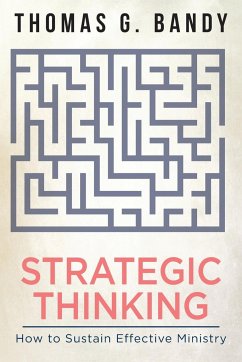Nicht lieferbar

Strategic Thinking
How to Sustain Effective Ministry
Versandkostenfrei!
Nicht lieferbar
Strategic thinking involves an element of risk. This is because the goal is not only to perfect ongoing programs, but to initiate new ideas and terminate ineffective tactics. The risk of strategic thinking arises because of the changes in the mission field (or community) in which, and toward whom, the church focuses its vision. Demographic research and lifestyle sensitivity are necessary for effective church ministries. Whenever a church fails to track demographic trends and shifting lifestyle expectations, the strategic thinking always stalls. Program improvements and new ideas never go beyon...
Strategic thinking involves an element of risk. This is because the goal is not only to perfect ongoing programs, but to initiate new ideas and terminate ineffective tactics. The risk of strategic thinking arises because of the changes in the mission field (or community) in which, and toward whom, the church focuses its vision. Demographic research and lifestyle sensitivity are necessary for effective church ministries. Whenever a church fails to track demographic trends and shifting lifestyle expectations, the strategic thinking always stalls. Program improvements and new ideas never go beyond the comfort zones of the members. Ineffective tactics are simply repeated over and over again because the church doesn't want to offend particular members or financial givers. In order to go beyond the box to be relevant to the changing community, churches must accept more risk. They must be willing to go beyond the comfort zones of members to improve the effectiveness of programs. They must be willing to risk failure and learn from mistakes by implementing creative new ideas. And they must be willing to stop wasting limited resources of time, talent, and money on sacred cows that no longer drive the church toward its vision. The challenge, of course, lies in keeping that line straight. This is not a curved line connecting identity, mission, and results. It is not a wavy line, or an intermittent line, or even partially angled line. It is not a line that sways one way to protect this self-interest, and another way to protect that membership privilege. It is not a line that takes a circuitous route to its destination in order not to disturb some leader's sensibilities or avoid stressing some faction's opinions. It is a straight line. Nothing else will really do. Keeping this line straight is the art of strategic thinking. Some new ideas will need to be started. Some old programs will need to be ended. Ongoing tactics will need to be adjusted. All this keeps the line straight. Moreover, some leaders will need to be hired or acquired; some leaders will need to be fired or dismissed; and some leaders will need to be redeployed. All that effort keeps the line straight. Therefore, strategic thinking is not about seeing a need and addressing it. It is about focusing a purpose and pursuing it ... doggedly, persistently, and single-mindedly.














